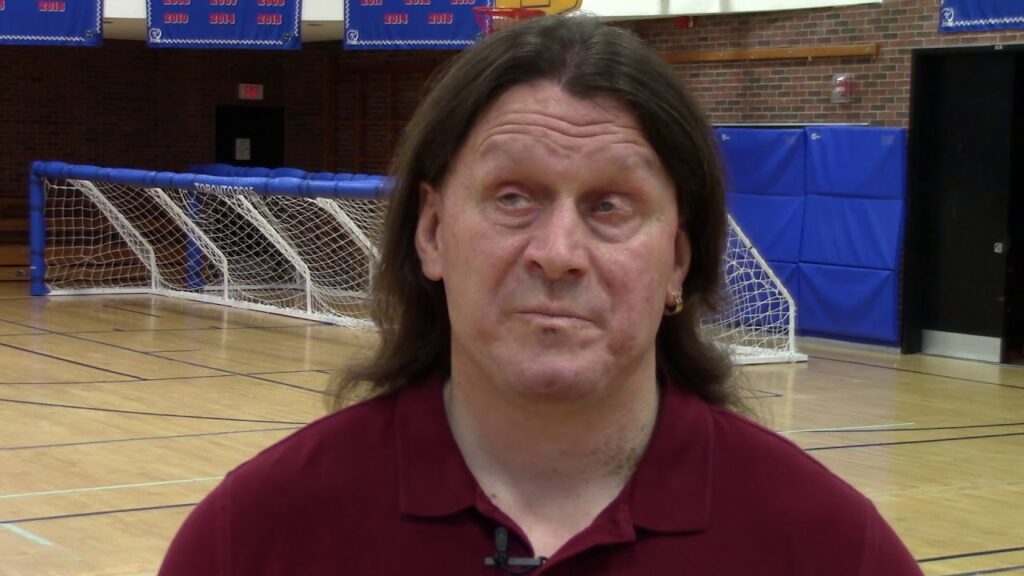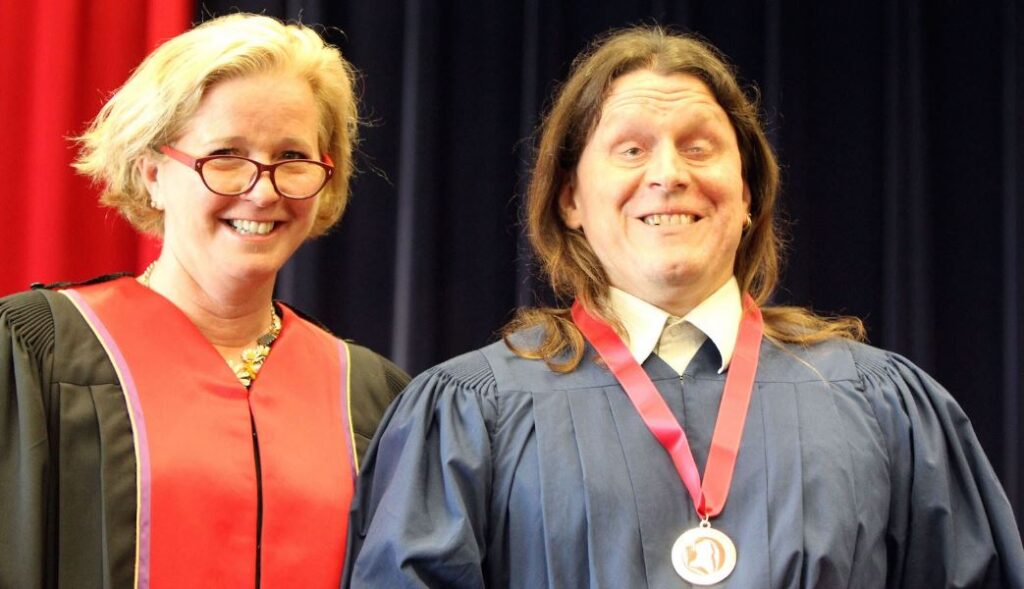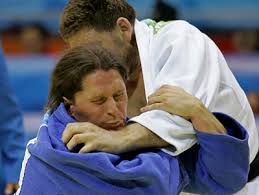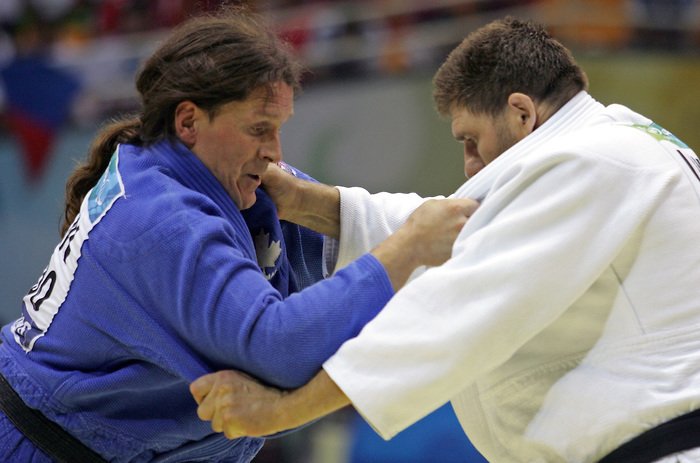Bill Morgan, who has competed in three Paralympics and an array of national and international judo events, has utilized these life-changing experiences to build a successful career in teaching.
Morgan, who moved to Brantford from Mactier, Ontario at an earlier age, discussed his youth and getting a chance to thrive.
“I lost my vision when I was five. I grew up in a small town so my opportunities were very limited as I was the only one that was blind growing up there. It wasn’t until I came to Brantford to attend the W. Ross Macdonald School for visually impaired students, that I had a true exposure to organized sports and I pretty much loved it right from day one,” he said. “I would find out that there are other people who are blind and that was a really big deal for me, because up until then I had never met another blind person…I went from the only one to one amongst a larger population, and that was instantaneously life changing for me, because I was surrounded by students that I knew I could relate to, and they could relate to me, but also the staff population who also had the knowledge and experience and comfort.”
While Morgan made the move to the city, he visited his family over the weekends.
“I traveled back and forth Fridays and Sundays and for a ten-year-old, that was a really big deal. I had a lot of homesickness initially, but the phone calls home during the week became less frequent as I got more comfortable with my new surroundings,” he noted. “W. Ross Macdonald truly became a home away from home…I was going to school during the day, but I was also living there too. And after school, I had a whole separate second half of the day where I could go to clubs, play sports and just hang out with friends.”
However, there was a teacher and coach who convinced Morgan to get into wrestling.
“The physical education teacher there was John Howe…and he was known for encouraging students to try out for sports, especially new students like me. He told me I could be a great wrestler, but as a ten-year-old wrestling was what I saw on television… What kid doesn’t want to hear that you can be big and famous and on TV? I soon realized that wasn’t the type of wrestling he was talking about,” he recalled. “I went on to have a huge wrestling career all through elementary and secondary school, competed locally, nationally, internationally [and] he was a great coach in that he encouraged us to do other things. For example, he wanted us to join the cross-country running team as well as the club, and just have a general overall level of fitness. I hated running…but he had this ability to help me to understand that it was for a greater purpose, and that it was going to help my wrestling. And I was passionate about wrestling, so I was going to do anything that was going to help me get better at it. Because the reality is, we don’t all love everything we do so he was teaching me more than wrestling, more than running…he was teaching me about how all of these skills could prepare me for life.”

Nevertheless, Morgan explained how wrestling gave him an opportunity to compete at a high level, even against opponents with sight.
“The interesting thing with wrestling is that there’s a few rules that have been implemented that really allow a person who’s blind or visually impaired to have a more equal playing field. You start by having contact with your opponent, and that way, you know where they are and they know where you are, and then off you go. It gave me a chance to be able to not only practice the sport, of course, but to compete against other sighted people. And again, keep in mind, this is the same young boy that had been told that I couldn’t do a lot of the things that sighted kids could do,” he reflected. “Wrestling taught me that I could go out and compete with sighted wrestlers. That was very motivational to me, because I learned from a young age…I wanted to be like any other kid. I didn’t want to be seen as special or different or unique…and so wrestling gave me a chance to prove that.”
After three years of wrestling, Morgan would win his first match, and would go on to achieve new heights of success.
“I went from not only winning my first match, but actually becoming Brant County elementary champion for my category. And so that really was the beginning of just an amazing journey of not only having a chance to compete with people who had their sight, but also to beat people who had their sight. So now I went from this kid who wasn’t just trying to do the same things that sighted kids were doing. That was so life changing for me and provided me the building blocks for things that did in my future,” Morgan said.
After a competition in Holland in 1990, Morgan would then discover judo, a sport that would give him a chance to become a Paralympian.
“It was exciting to me, but also because it was a Paralympic sport and wrestling was not. That had become a real driving force for me, that I wanted to be a Paralympian, and wrestling wasn’t going to allow me to get there, but Judo could…one of my classes that I was taking was about goal setting. And I had set the goal of becoming a Paralympian…though I had no clue what that really meant at the time. It took me ten years to achieve that goal, and a lot of ups and downs and injuries and wins and losses. But that was the goal, and slowly but surely, I worked my way to achieving that goal,” Morgan recalled. “I had success earlier because I had a good wrestling background to get me started, but there is a big learning curve too. I started having some success, and I would compete locally. [However,] there’s not a lot of other blind competitors in the country, so it’s very unique, because I would get most of my competition practice against people who could see.”

After years of training and competition in Judo, Morgan went to the World Championships and the Pan American Games.
“My first competition against other blind competitors was in 1998 in Madrid, Spain, and I finished fifth. I went from having some success locally against individuals who could see, to now being in the top five in the world against the blind competitors. I realized that I’d found my place and I could do something with it…a year later, I went to the qualifying tournament for the Sydney Paralympic Games in Colorado Springs. And at that time, how it worked was that so many competitors from each geographical region could qualify to go to the Paralympics, so via the Pan American Games…only one athlete for each weight category was able to qualify. I felt I hadn’t performed well…and despite the nerves and the pressure, I still won the gold medal [and] qualified to go to Sydney, which was a year later,” recalled Morgan.
While Morgan set his focus on the 2000 Paralympics, he would find himself at a crossroads after a severe injury but was inspired by an old mentor.
“I got invited to train in Montreal with the Olympic team, which was a new thing for the blind program…to integrate us into their training camp. It was grueling and hard work, and I was hanging in there and doing great. Then on the second last day during the last five-minute session, I ended up being injured and was hospitalized…I was in really rough shape and it was about seven weeks before leaving for Sydney which I was sure I wouldn’t be going to. And then a couple things happened. I started getting some therapy which helped and coach John Howe, who had just become vice principal at the school noticed me sort of dragging myself around at school. He pulled me into his office [and] I shared with him what had happened and also told him I wasn’t going to Sydney,” he said. “He made it really clear to me that not going was not an option. He said to me; you may never get to go again and that I earned this opportunity to go. I hadn’t thought of it that way. I’d always thought of it as I’ve never been one to just want to be somewhere. I wanted to win. I’m competitive. And so that day forward, he changed my mindset…and I ended up winning two matches [at the Paralympics,] and finished seventh, far better than I would have, would have dreamt.”
When Morgan got back from Australia, he took some time to recover and then got back to training for the next Paralympics.
“It was another four-year journey, and I would finish fifth in Athens. It was better than Sydney, and I was quite close to winning a bronze medal. I did another four years and went to Beijing, but I didn’t do so well there [and] unfortunately, I went there injured, so similar to Australia…I knew that one was going to be my last time, because of my significant injuries. I had torn my ACL and my right knee, and in order to fix it, that required surgery. We looked at my age and trying to recover from that, and it didn’t make sense to embark on another four-year journey,” he said.

However, along his competitive career, Morgan had been working towards the next step of his life.
“In my last competition in Turkey in 2010, I did quite poorly and came to terms that I was done. I was sort of having a good day or a good moment or two, which would kind of keep the fire lit. But I had kept up with my education. I was still taking college courses and started attending university seeking a career change or what I was doing, but I had earned what were called tuition credits while being on the national program. I had funding available to actually further my studies, and I deferred that until closer to the end of my career. The best way I can describe it is I had a sum of money available to me that I could put toward a diploma or a degree. And I said to myself that I’d be foolish to not try. The first course I took was not a good experience [however, I persevered] and I decided to do a second course, which I loved. I kept on plugging along and…I applied myself,” he said. “At first, I studied criminology, because I was very fascinated by it [and] really wanted to work in the prison system as a parole officer. I went and toured some federal prisons to see how a blind person would be able to fit into that situation. There were obviously some potential risks, but I wanted to make that determination for myself…ultimately I chose not to pursue that career [and would then make the decision] to go to on another path…I figured out what I had to do and finish the necessary courses to apply to go to Teachers College, and because I had been working at W. Ross Macdonald as an educational assistant for so many years, I thought I needed a change. I took eight months off to go to school and to train as a teacher. Then later that year, I resigned from my position and started the journey of becoming a teacher at the school.”
Morgan, who was inducted into the Brantford and Area Sports Hall of Recognition in 2017, has been relishing his teaching role at W. Ross Macdonald ever since.
“I’m loving my teaching position right now. And I really feel like I’ve found my spot. I’m seeing success by implementing a lot of those little bits and pieces that I picked up along the way in my own journey, and now I get a chance to share it with others, whether it be students, or the staff,” Morgan said. “I realized the other day, combining my student and staff experience, I have been working at the W. Ross Macdonald school for 40 years. And now I have more of a say on the way I teach the students because of my experience. Before, I was supporting the teacher, and so I was on their journey, and now I get to steer the ship, and implement my ideas of what I envision, and I’m really glad I made the change, and I’m really glad I have had this opportunity.”
